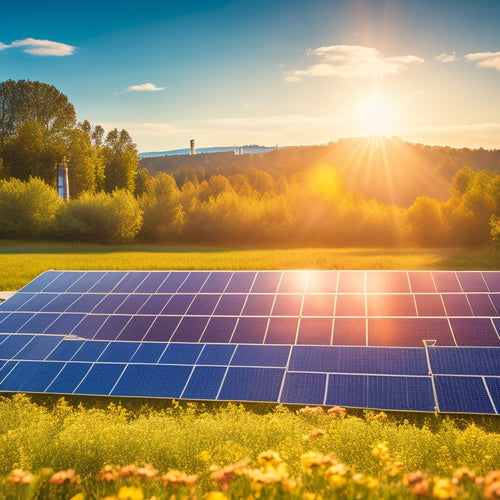
Eco-Friendly Solar Panel Cleaning Methods
Share
You can optimize your solar panel's energy output while minimizing your environmental footprint by adopting eco-friendly cleaning methods that conserve water, reduce chemical runoff, and promote sustainable practices. Consider rainwater harvesting, dry cleaning, or drip irrigation to reduce water waste. Implementing greywater systems, portable solar water purification, and minimizing chemical runoff can further decrease your environmental impact. With regular cleaning, you can increase energy output by up to 25% and reduce reliance on non-renewable sources. Now, identify the specific techniques that'll help you make the most of your solar panels while staying eco-friendly.
At a Glance
- Rainwater harvesting and dry cleaning are eco-friendly solar panel cleaning methods that conserve water and reduce chemical runoff.
- Water recycling options like greywater systems and portable solar water purification minimize water waste and promote sustainability.
- Regular cleaning increases energy harvesting by up to 25%, reducing reliance on non-renewable sources and supporting renewable energy initiatives.
- Micro-cleaning techniques, such as using deionized water and controlling droplet size, enhance cleaning effectiveness while minimizing environmental impact.
- Proper solar panel tilt optimization and shade analysis ensure optimal energy production, promoting energy independence and environmental conservation.
Reducing Water Waste Matters
When you're cleaning your solar panels, you're likely aware that water is a precious resource.
To minimize your environmental footprint, you'll want to adopt water conservation methods that reduce the amount of water used in the cleaning process.
Water Conservation Methods
Optimize your solar panel cleaning routine by adopting water conservation methods that greatly reduce water waste. You can make a significant impact by implementing simple yet effective strategies. One approach is rainwater harvesting, which involves collecting and storing rainwater for cleaning your solar panels. This method is not only eco-friendly but also reduces your reliance on potable water.
Another approach is dry cleaning, which uses brushes or air blowers to remove dirt and debris from your solar panels. This method is particularly useful in areas with low rainfall or water restrictions.
Here is a comparison of different water conservation methods for solar panel cleaning:
| Method | Water Usage | Effectiveness | Cost |
|---|---|---|---|
| Rainwater Harvesting | 0 gallons | High | Low-Medium |
| Dry Cleaning | 0 gallons | Medium-High | Medium-High |
| Traditional Water Cleaning | 10-20 gallons | High | Low |
| Drip Irrigation | 5-10 gallons | Medium-High | Medium |
Water Recycling Options
By incorporating water recycling options into your solar panel cleaning routine, you can substantially reduce water waste and minimize your environmental footprint. This approach not only conserves water but also reduces the amount of chemicals and contaminants released into the environment.
Additionally, adopting eco-friendly practices, such as using portable solar water purification systems, can also contribute to a more sustainable future. One effective water recycling option is rainwater harvesting, which involves collecting and storing rainwater for use in cleaning solar panels. This approach is particularly useful in areas with high rainfall, as it reduces the demand on potable water sources.
Another option is greywater systems, which reuse water from sinks, showers, and washing machines for irrigation and cleaning purposes. By implementing greywater systems, you can reduce the amount of freshwater used for cleaning solar panels, thereby minimizing water waste and conserving this essential resource.
Both rainwater harvesting and greywater systems require proper installation, maintenance, and treatment to guarantee the water is safe for use. By adopting these water recycling options, you can make a significant impact on reducing water waste and promoting a more sustainable future.
Boosts Energy Output Significantly
When you use eco-friendly solar panel cleaning methods, you'll experience a significant increase in energy output.
High-quality solar panels, such as those from SunPower, are designed to maximize energy harvesting, and cleaning them regularly can further enhance their performance.
Increased Energy Harvesting
Through regular cleaning, your solar panels can reap the benefits of increased energy collection, which directly translates to a significant enhancement in energy output. This is vital in today's era where energy optimization is key to maximizing the full potential of renewable resources. By removing dirt, grime, and other obstructions, you can guarantee your solar panels operate at peak performance, generating more power and reducing your reliance on non-renewable energy sources.
| Dirt Level | Energy Loss | Cleaning Frequency |
|---|---|---|
| Light | 5-10% | Quarterly |
| Moderate | 10-20% | Bi-Monthly |
| Heavy | 20-30% | Monthly |
| Extreme | 30-50% | Weekly |
| Critical | 50%+ | Daily |
Improved Panel Efficiency
Regular cleaning not only enhances energy harvesting but also greatly improves panel efficiency, allowing your solar panels to operate at their peak capacity. This is because dirt accumulation on the panels' surface reduces their ability to absorb sunlight, resulting in decreased energy output.
By keeping your panels clean, you can verify they're working at their best, maximizing your energy output and saving you money on your utility bills. In addition, residential renewable energy solutions renewable energy source can provide a sustainable alternative to traditional energy sources, reducing your reliance on the grid and minimizing your carbon footprint.
Effective panel maintenance is critical to maintaining superior panel efficiency. A clean panel can increase energy output by up to 25%, whereas a dirty panel can decrease output by as much as 15%. This significant difference in energy output can have a substantial impact on your wallet and the environment.
Micro-Cleaning With Deionized Water
When you opt for micro-cleaning with deionized water, you'll soon realize that water quality matters. The purity of the water used directly affects the cleaning process, as impurities can leave streaks or residue on the panels.
For instance, renewable energy systems rely on efficient cleaning to maximize energy output. Similarly, off-grid solar systems require clean panels to generate power reliably.
Water Quality Matters
Deionized water, a highly purified liquid, plays a crucial role in micro-cleaning solar panels. When you opt for deionized water, you guarantee that your solar panels are free from contaminants that can affect their performance. This type of water is particularly useful when you're dealing with sensitive panel materials that can be damaged by impurities.
| Water Source | Water Quality |
|---|---|
| Rain Water | May contain impurities, sediment, and organic matter |
| Tap Water | May contain minerals, chlorine, and other chemicals |
| Deionized Water | Highly purified, free from impurities and minerals |
When selecting a water source for micro-cleaning, consider the cleaning frequency and the environmental impact of your choice. Deionized water is an eco-friendly option that reduces the need for chemical-based cleaning solutions. Additionally, it helps maintain your maintenance schedules by preventing damage to the panels. It's crucial to invest in a reliable filtration system to guarantee a consistent supply of deionized water for your micro-cleaning needs. By doing so, you'll be able to enjoy the benefits of clean and efficient solar panels while minimizing your environmental footprint.
Droplet Size Control
By opting for deionized water in your micro-cleaning process, you're guaranteeing your solar panels remain free from contaminants that can hinder their performance.
The next vital step is to control the droplet size during the cleaning process. This is where droplet size control comes into play.
When using a spray nozzle, the droplet formation process is essential. Larger droplets can lead to excessive water consumption, while smaller droplets may not effectively remove dirt and debris. You need to strike a balance between the two.
By adjusting the spray nozzle's pressure and flow rate, you can achieve ideal droplet formation. This guarantees that the cleaning solution effectively reaches all areas of the solar panel, removing dirt and grime without wasting water.
A well-controlled droplet size also helps prevent water spots and mineral deposits from forming on the panel's surface. This is particularly important when using deionized water, as it's more susceptible to leaving behind mineral deposits.
Assess Your Panel's Tilt
You'll want to evaluate your solar panel's tilt to guarantee ideal energy harvesting, which is essential for homes relying on off-grid solar systems off grid renewable energy.
This involves calculating the angle of incidence, which affects the amount of sunlight your panels receive.
Next, you'll need to perform a shade analysis to identify any potential obstructions that could impact energy production.
Angle of Incidence
As your solar panel's tilt greatly affects its energy output, evaluating the angle of incidence is essential for ideal performance. The angle of incidence refers to the angle at which sunlight hits your solar panel. When sunlight hits your panel directly, it maximizes energy output. However, if the angle is too shallow or too steep, sunlight reflection occurs, reducing energy production.
To optimize the angle of incidence, consider the following factors:
| Latitude | Optimal Tilt Angle |
|---|---|
| 0° - 25° | 15° - 25° |
| 25° - 50° | 25° - 35° |
| 50° - 90° | 35° - 45° |
Shade Analysis
How much of your solar panel's surface area is compromised by shade? Evaluating your panel's tilt is essential to understanding the shade impact on your energy production. You can't control the sun's position, but you can enhance your panel's angle to minimize shading.
Conduct a shade analysis to identify areas where shade affects your panel's performance. Start by observing the sun's path during peak hours (9 am - 3 pm) and note any obstructions, such as trees, buildings, or nearby structures. Measure the length and width of these obstructions to determine the shade's impact on your panel.
Next, calculate the tilt angle of your panel to determine the best position for maximum energy production. Consider factors like roof pitch, surrounding environment, and local building codes when adjusting your panel's tilt.
Less Chemical Runoff Risk
You'll want to investigate water conservation methods that minimize chemical runoff when cleaning your solar panels.
These methods prioritize efficient water use and reduce the risk of contaminating nearby water sources.
Water Conservation Methods
Your solar panels' cleanliness directly impacts their energy output, and conserving water while cleaning them is essential to minimize chemical runoff risk.
When you opt for water conservation methods, you not only reduce your environmental footprint but also lower your water bill.
Implementing a drip irrigation system around your solar panels can greatly reduce water waste. This efficient irrigation method delivers water directly to the roots of plants, minimizing evaporation and runoff.
Additionally, incorporating sustainable landscaping practices, such as using drought-resistant plants and mulch, can further reduce water consumption.
By adopting these eco-friendly methods, you'll conserve water and reduce the amount of chemicals used in cleaning, resulting in a more environmentally friendly solar panel cleaning process.
This approach not only benefits the environment but also helps you maintain your solar panels' peak performance while enjoying the freedom to live sustainably.
Frequently Asked Questions
Can I Clean Solar Panels During Peak Sun Hours?
You shouldn't clean solar panels during peak sun hours, as it can reduce solar panel efficiency and compromise cleaning safety; instead, schedule cleaning during early morning or late afternoon to guarantee ideal energy output and a safe process.
Do I Need to Clean My Solar Panels in Winter?
Just like a snowplow clears roads, you should clear snow from your solar panels to guarantee peak energy production. You'll want to clean them during winter, as snow accumulation can reduce efficiency by up to 15%, making winter maintenance a must.
Are There Any Robotic Solar Panel Cleaning Solutions?
You're exploring robotic solutions for efficient cleaning; yes, automated cleaning systems exist, featuring robotic arms or drones that maneuver and clean panels, reducing labor costs and increasing energy output, giving you more freedom to focus on what matters.
Can I Use a Pressure Washer to Clean Solar Panels?
As you ponder the pressure washer, envision water jets blasting dirt off your panels, but beware: high pressure can damage sensitive components, so it's essential to weigh the risks and investigate gentler solar panel maintenance and cleaning techniques that prioritize freedom from harm.
How Often Should I Clean My Solar Panels?
You'll want to clean your solar panels every 6-12 months, depending on environmental factors like dust and pollen. Regular cleaning enhances efficiency; consider seasonal maintenance tips to optimize energy output and prolong panel lifespan.
Explore More
As you utilize the power of the sun, remember that a clean slate is key to maximizing energy output. Just like the mythical Phoenix rising from the ashes, your solar panels can emerge revitalized from a good cleaning. By adopting eco-friendly solar panel cleaning methods, you'll be doing your part to reduce water waste and minimize chemical runoff. It's a bright idea that's simply radiant - and your planet (and wallet) will thank you.
Related Posts
-

Advantages of Solar Generating Systems Over Traditional Energy
Solar generating systems provide several key advantages over traditional energy sources. You'll experience lower long...
-

Top Off Grid Solar Batteries for Renewable Energy
When seeking top off-grid solar batteries for renewable energy, consider options with advanced battery chemistry, suc...
-

Off Grid Solar Batteries
As you shift to off-grid living, you'll rely on high-performance solar batteries to store excess energy generated by ...


